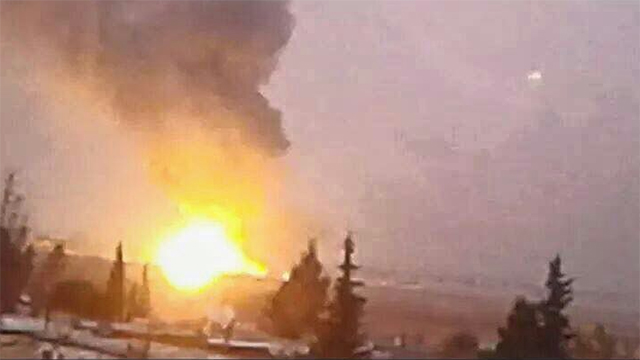Arabic-language press reports alleged IAF strike targeted sites storing Russian-made advanced Syrian missiles for Hezbollah.
Moscow demands explanation.
By Roi Kais
Two Hezbollah activists were killed Sunday in what foreign sources have said was an Israeli airstrike on military targets in Syria, the Al Arabiya news channel reported Monday. The report contradicts earlier claims by Syrian security forces, who said Sunday that there had been no casualties in the attack.

Smoke trails over Syria allegedly left by IAF warplanes.
While official Israel continues to keep mum on the daylight attack in Syria that has been attributed to it, the Arab press has in the meantime published more and more details about the alleged Israeli assault.
Al-Arabiya also said that one of the two dead men had been a senior military official in Hezbollah.
According to reports, which are so far unsubstantiated, eight Israel Air Force warplanes participated in the strikes close to the international airport on the outskirts of Damascus. The target, the reports say, was most likely a warehouse containing new Russian-made anti-aircraft missiles that were en route to Lebanon.
Intelligence Minister Yuval Steinitz refused to comment directly on Sunday’s incident, but noted Israel has a “firm policy of preventing all possible transfers of sophisticated weapons to terrorist organizations.”
Condemnation
Russia on Monday demanded an explanation for the airstrikes, while the Syrian and Iranian foreign ministers called it an act of aggression that proves Israel was “in the same trench” with extremist groups fighting the Syrian government.

Fire from alleged IAF strike in Syria
“Moscow is deeply concerned about this dangerous development which requires a detailed investigation,” ministry spokesman Alexander Lukashevich said.
In a statement, he said that the use of force is “unacceptable in international relations and deserves an outright condemnation.”
The Ministry sent a letter to the United Nations complaining about Israel’s “aggressive action” and demanded that such attacks should not happen again, Lukashevich added.
London-published newspaper Al-Quds Al-Arabi on Monday morning quoted Syrian officials as saying that an Israeli attack possibly intended to strike the warehouse containing modern Russian-made missiles destined for Hezbollah. According to the same sources, the airport at Dimas, close to the Syria-Lebanon border, was apparently a storage point for advanced air defense missiles recently delivered from Russia.
Meanwhile, Lebanon’s Al Akhbar newspaper, which is affiliated with Hezbollah, quoted security sources as saying that eight Israeli warplanes attacked two targets. According to the same sources, “the first site attacked, near Damascus International Airport, is a hangar for unloading goods. The second site was reportedly a row of hangars within a military installation.”
The sources denied unconfirmed reports that the assault included bombing positions in Sabura or attacks on the 90th Syrian army division in Quneitra. The lead story in the newspaper appeared under the headline: “Bombing weapons of the resistance. Israel provokes”.
At the same time, Lebanese newspaper As-Safir, also affiliated with Hezbollah, quoted Syrian officials as saying that the attacks were designed to disrupt recent weapons deliveries to Syria. The officials reportedly denied rumors that Russian-made S-300 missiles had been in the warehouses. These missiles, they said, had not been delivered.
The newspaper also reported the relatively “small” intensity of the explosions, compared to the large explosions heard in previous raids, and claimed this supported the impression that the raids had not achieved their goal – the destruction of large stockpiles at the airport.
Hours after Syria reported the bombings, the Syrian foreign office sent two missives to the secretary-general of the UN and the head of the Security Council in protest of Israel’s attacks.
“Syria demands that sanctions be placed to deter Israel, which doesn’t hide its policy of supporting terror and its malicious intentions against Syria,” read one letter. “Syria further demands to implement all methods determined in the UN Charter to prevent Israel from repeating these attacks.”
Meanwhile, Lebanon’s Al Akhbar newspaper published Monday morning an article bearing the headline: “Netanyahu bolsters his public credit… in Syria,” suggesting that the timing of the attack was politically motivated.
Also Sunday, Iranian Foreign Minister Mohammed Javad Zarif met with his Syrian counterpart, Walid Muallem, in Tehran.
In a press conference at the end of the meeting, Zarif said that “Iran condemns Israel’s attack in Syria. Yesterday’s attack indicates that this step was coordinated with terror organizations in Syria.”
Muallem said that “Israel attacked yesterday to raise the terrorists’ morale after their decline in the field.”
AFP contributed to this report.
View original Ynet publication at: http://www.ynetnews.com/articles/0,7340,L-4600883,00.html






 Israeli New Shekel Exchange Rate
Israeli New Shekel Exchange Rate